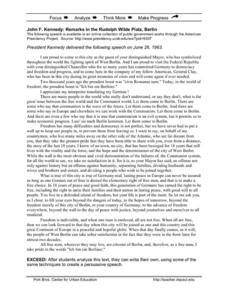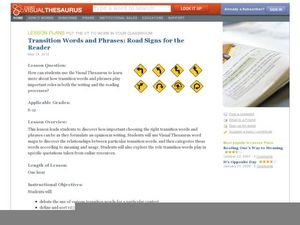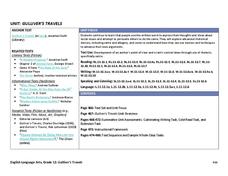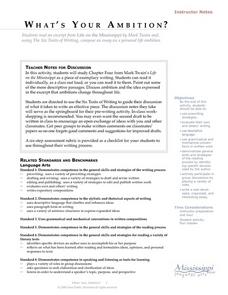Curated OER
Liberty Rhetoric
What is liberty rhetoric? Examine how people have used it in four different time periods and situations. High schoolers investigate original source documents and compare them with the Declaration of Independence to decide how liberty...
Curated OER
Rhetorical Devices in a Primary Source
Analyze Martin Luther King Jr.'s famous and powerful "I Have a Dream" speech as a primary source document. After reading up on rhetorical devices and working in small groups to define terms, class members identify and explain the use of...
Literacy Design Collaborative
The Art of Persuasion: How Rhetorical Devices Influence Audiences
Scholars analyze a variety of text to identify the development of claims and persuasive techniques writers use. In each text, pupils determine the argument and the persuasive techniques and complete a task introduction worksheet. The...
Curated OER
Eloquent Words
Logan’s Lament, a speech delivered by Mingo Chief Logan in 1774, provides pupils with an opportunity to not only study the historical events surrounding the battle between Native Americans and the Europeans for the West Virginia...
ReadWriteThink
Analyzing Famous Speeches as Arguments
A speaker, a message, an audience. After analyzing these elements in Queen Elizabeth's speech to the troops at Tilbury, groups analyze how other speakers use an awareness of events, and their audience to craft their arguments....
Curated OER
In The Words of Abraham Lincoln...
High schoolers explore the words of Abraham Lincoln. In this Abraham Lincoln lesson, students analyze segments of "The Gettysburg Address," his annual address to Congress in 1862, and his letter to Mrs. Bixby. High schoolers conduct...
Scholastic
Persuasive Communication (Grades 9–12)
Before your young scholars reached your morning class to learn about persuasive writing, they probably saw dozens of examples of persuasive communication in the form of advertisements. A short, introductory lesson inspires class members...
Franklin D. Roosevelt Presidential Library & Museum
Pearl Harbor Activity #2: Why Do Words Matter?
Words matter! That's the big idea behind an activity that asks scholars to replace words in FDR's "Day of Infamy" speech with synonyms. They then listen to a recording of President Roosevelt's address and compare his version to their own.
Polk Bros Foundation
John F. Kennedy: Remarks in the Rudolph Wilde Platz, Berlin
“Ich bin ein Berliner.” Here’s the full text of John F. Kennedy’s famous address delivered to the people of Berlin on June 26, 1963. The resource could be used as part of a study of Kennedy’s presidency, of rhetorical devices, or as...
Texas Education Agency (TEA)
Syntax (English II Reading)
Lesson five in the series focuses on syntax and the elements that make sentences enjoyable. Learners practice building different clauses and phrases and using figures of speech and rhetorical and literary devices.
Curated OER
Transition Words and Phrases: Road Signs for the Reader
Therefore! However! Furthermore! Explore the power of transition words and phrases. Signal your readers by suggesting the relationship between different thoughts or points. Help them demonstrate an understanding of word relationships.
California Federation of Chaparral Poets, Inc
Poetic Devices
Have everything you need to know about the elements of poetry with a nine-page handout. Split into four categories—word sounds, meanings, arrangement, and imagery—budding poets may reference terms, read definitions, descriptions, and...
Franklin D. Roosevelt Presidential Library & Museum
Pearl Harbor Activity #4: Who is the Audience?
Young historians use the prompts on a worksheet to analyze President Roosevelt's "Day of Infamy" speech. They identify the intended audience for the speech, the devices FDR used to persuade his audience, the responses promoted, and the...
Louisiana Department of Education
Gulliver’s Travels
Gulliver's Travels tells the story of a man who goes on voyages and encounters strange people. A unit plan introduces readers to the classic text, as well as excerpts from other examples of sarcasm and satire, such as "A Modest Proposal"...
Southern Nevada Regional Professional Development Program
Poetry Aloud/Poetry Out Loud
To appreciate the value of seeing and hearing a poetry performance, groups prepare readings of selected poems and then compare and critique their interpretations and videotaped versions of the same poem. Included in the resource are...
Shmoop
ELA.CCSS.ELA-Literacy.SL.9-10.3
Don't let your pupils take everything at face value! They should analyze and evaluate what speakers say. Practice this skill with the two related activities described here. After brainstorming critical questions, learners can listen to...
Curated OER
Synecdoche vs. Metonymy: Definitions
Ask your class to lend their ears, and eyes, to a short video that defines and offers examples of synecdoche and metonymy. Whether it be brand names like Kleenex® and Band-aids® that have come to stand for all the products in a category,...
Curated OER
Cliches, Paradoxes
Clichés, paradoxes, and equivocations are detailed in a short, animated video that defines and illustrates these writing traps. The resource also includes a quiz and the transcript for the video. Users can register to access free course...
Curated OER
Emotion or Reason?
Students use persuasive devices to construct oral or written arguments. In this arguments lesson, students discuss the types of persuasive devices used in arguments and form groups to select a topic to research. Students create a...
Curated OER
WH AT' S Y O U R A M B I T I O N?
High schoolers read and analyze an excerpt from Life on the Mississippi by Mark Twain. Students use the Six Traits of Writing to compose an essay on a personal life ambition that each high schoolers may have. Students use prewriting...
Alabama Learning Exchange
Environmental Scrapbook and Podcast
High schoolers collect newspaper and magazine articles about the environment and construct a scrapbook using construction paper, glue, and scissors. To make it even more environmentally friendly, groups can create an online scrapbook...
Curated OER
SAT Sentence Completion Practice Test 10
In this sentence completion practice test, students choose the word that best completes each sentence. Students have 10 minutes to answer 12 questions in this SAT practice worksheet.
Other popular searches
- Rhetorical Devices
- Public Speaking Rhetoric
- Gettysburg Address Rhetoric
- Rhetorical Questions
- Speech and Rhetoric
- Rhetorical Analysis
- Rhetoric Logos Pathos Ethos
- Political Rhetoric
- Speeches Rhetoric
- Speech Rhetorical Devices
- Rhetorical Devices in Songs
- Rhetorical Strategies























